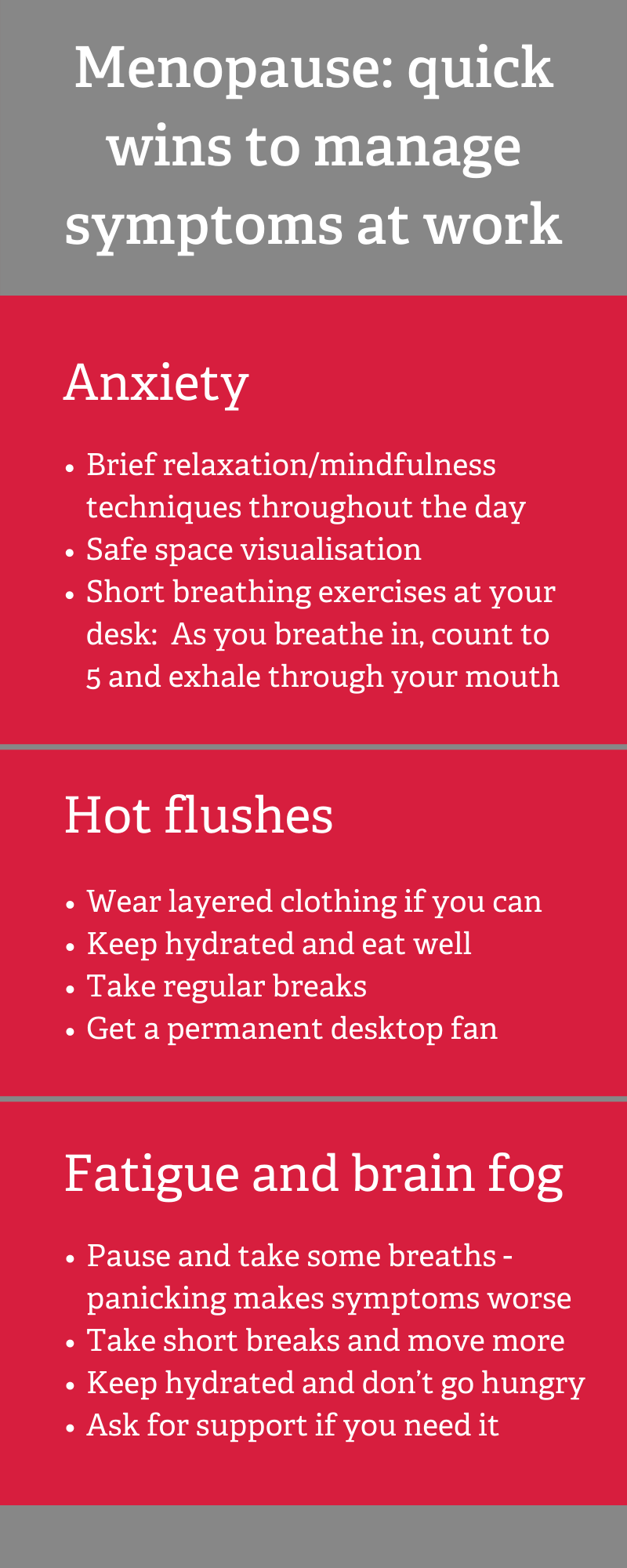Menopause is something every woman faces and it can have a major impact on day-to-day life, both at home and at work.
Whether you’re working behind a desk, or you’re on the move and out on shouts, understanding the effect menopause symptoms can have on you is hugely important – while finding ways of coping with them to reduce the impact on your normal routine.
Sadly there can still be a certain stigma around menopause, even now, so understanding exactly what it involves is important for everyone.
There is also a false view that it’s something that happens to older women – when actually, menopause can hit at very different times for different women. That being said, most people will experience it to some degree between the ages of 45 and 55, so preparing early can only help.
Here, our Wellness & Behaviour Change Coaches Sally Walker and AJ Whitaker share some tips to cope with menopause symptoms:
Psychological symptoms
Menopause can have a psychological impact. Here are just a few of the symptoms some women experience:
- Mood swings
- Anxiety/Fear/Panic
- Low mood
- Tearful
- Nervous/tense
- Overthinking
- Crying spells
- Sleep issues
- Poor concentration
- Irritability
- Angry
- Depressed
- Low tolerance
- Agoraphobia
- Low self esteem/confidence
- Forgetfulness/brain fog
- Loss of joy
- Low libido
Physical symptoms
There is oestrogen in every cell of the body so when levels drop and hormones fluctuate it can have a massive impact on physical health. Here are a few of the common physical symptoms:
- Hot flushes
- Night sweats (Vasomotor symptoms)
- Fatigue
- Insomnia/sleep issues
- Muscle/joint pain
- Hair loss
- Dry/itchy skin
- Headaches/migraines
- Dizziness
- Numbness in hands/feet
- Breathing difficulties
- Palpitations
- Vaginal issues
- Weight loss/gain
- Incontinence
- Urinary issues (UTI’s)
Impact of symptoms
The above symptoms can have far-reaching impacts on you in everyday life, so it’s important to understand that they’re completely normal and something many others will be facing around the same time as you.
Your general performance at work may be affected, due to either physical or psychological symptoms you’re facing, and – in some cases – may mean more absence from work.
You may also find it more difficult to communicate and struggle to carry on with normal commitments.
It’s not only work that can be affected, however, and some symptoms could become noticeable at home and in family life – so talking about them openly is hugely helpful, especially for family members of friends who may not have first-hand experience of what you’re going through.
Finally, it can sometimes lead to a change in self-perception, so being aware of that and understanding what it is that’s happening to you body is important.
Tips to manage symptoms

Taking time for yourself to relax can prove transformational. There are some relaxation techniques you can try here.
Remember: don’t judge yourself too harshly or compare yourself to others. Menopause is different for everyone, so pacing yourself, being aware of your own body’s changes, and finding individual ways of coping is key.
Open communication with your partner, family and work colleagues is one of the best possible tips. Discuss what will help you and what the key things are you need to make you more comfortable.
When it comes to hot flushes, having ways of coping with them can prove beneficial, such as a fan or cooling device on hand at work or at home. Your choice of fabrics, both for your bed sheets and clothing, can help a lot with these too.
Speaking openly to others going through what you are can be the best help, as you can exchange experiences and tips, while consultations with your GP if you’re struggling are recommended.
A balanced diet can also really help when it comes to menopause too – as can staying hydrated. Cutting down alcohol and caffeine can have a positive impact, while adding more fruit, veg, fibre and protein to your diet is advised. Something as simple as reducing the amount of processed foods you’re having can make a real difference, while exercising regularly has physical as well as mental health benefits.
What next?
For some women, hormone replacement therapy (HRT) can be a solution if they’re really struggling. HRT helps maintain oestrogen levels and therefore protects bone health as well as reducing the impact and/or eliminating many of the symptoms of menopause.
If you are not be able to take HRT or prefer not to, self-help techniques and interventions can be extremely effective in managing symptoms too.
Chatting through options with your GP is often helpful.
Listen to our podcast episodes around menopause
In a particularly candid chat, our Wellness and Behaviour Change Coaches, AJ Whitaker and Sally Walker, share some of their personal experiences of menopause and discuss everything from brain fog to HRT and the early symptoms of peri-menopause and menopause. Listen to both parts of the discussion here:
Try our online courses
You can find more courses HERE and also join our Understanding Menopause Wellness Workshop Group in My Fire Fighters Charity, where you can chat to others going through similar experiences and access advice and peer support. Just ensure you’re registered and head to the ‘Groups’ tab at the top.
Please let us know if you found this article helpful, or if there’s anything you’d like us to have focused on more in the feedback section below.




